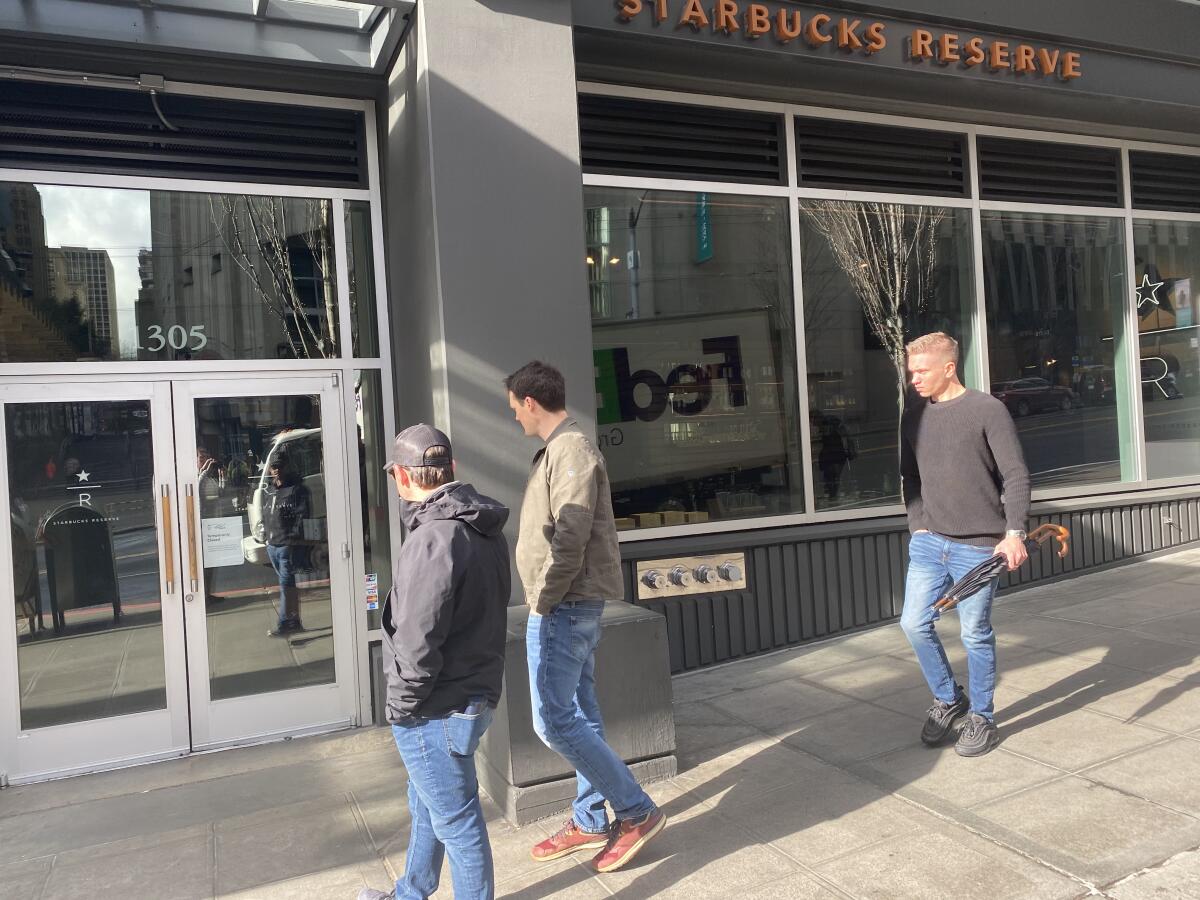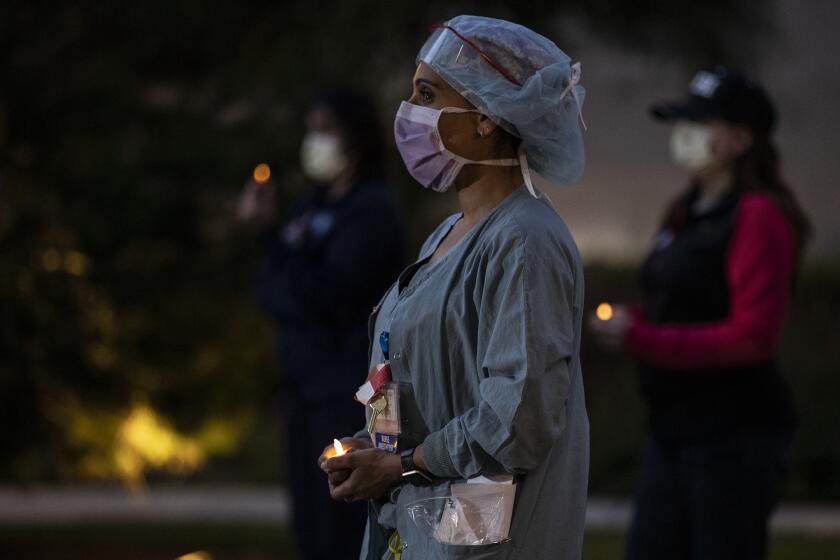Grocery stores and coffee chains gave workers hazard pay. Now they’re taking it back

They called it hero pay.
As coronavirus cases soared and state and local governments issued stay-at-home orders, grocery workers navigating wraparound lines and panicked customers grew anxious about exposure to the virus.
Companies resorted to offering essential workers financial incentives in an effort to keep operations running. Major chains, including Target, Walmart, CVS, Whole Foods, Costco, Sprouts and Kroger, offered bonuses or temporary raises to employees.
Starbucks shuttered thousands of stores and offered all employees a month of paid leave. Those that stayed on to work the drive-throughs that remained open received a $3-an-hour raise.
But this rise in wages — the “hero bonuses” and “appreciation pay” — is already subsiding, even with the number of new infections refusing to fall. With Starbucks reopening stores, those $3 raises will terminate at the end of May. So will Target’s $2 hourly raise. Kroger-owned grocery chains such as Ralphs, QFC and Fred Meyer will stop paying an extra $2 per hour Sunday.
That’s an unwelcome surprise to employees who feel the circumstances that won them extra pay haven’t changed much.
The COVID-19 pandemic is unleashing a wave of labor unrest harnessing front-line workers’ fear and anger across California and the nation.
“The pandemic isn’t going away, coronavirus isn’t going away, so why are they taking away these two dollars from us? It’s absurd,” Ralphs cashier Dionna Richardson said.
Grocery stores have seen their share of infections. An outbreak at a Ralphs in Hollywood marked the largest cluster of cases at a retail store recorded by the Los Angeles County Department of Public Health. Out of 158 employees, 21 have tested positive for the virus. Scores of grocery workers across the country have died.
The store Richardson works at on Mid-Wilshire is just as busy and conditions are just as risky as they’ve been since the start of the crisis, she said. Customers and employees often can’t or won’t maintain the recommended six feet of space between themselves.
Ralphs installed Plexiglass barriers at registers, but they’re scant protection. Customers lean on the barriers and poke their head around the sides, Richardson said.
Often, customers aren’t wearing face coverings. When that happens, Richardson takes it upon herself to ask them to wear one. Some push back, making aggressive or testy remarks, or refusing to leave the store. “It’s like a war zone sometimes,” she said.
Unions such as UFCW Local 770, which represents more than 20,000 grocery workers in Los Angeles, Ventura, Santa Barbara and San Luis Obispo counties, criticized the shift.
“The pandemic exposed how little corporations pay many workers, workers on whom the public deeply depends,” said John Grant, president of UFCW Local 770 in a statement. “With all eyes on essential workers during the pandemic, grocery corporations were quick to capitalize on the good PR of raising wages, but they cannot justify taking them away, especially since they have continued to do business while so many other businesses are closed and their profits are record high.”
While lockdowns have caused financial strain for many companies, grocery and pharmacy companies have seen gains in sales as demand for essential goods and food has skyrocketed. Drugstore chain CVS Health saw its first quarter profits surge 41%, for example.
A Kroger spokeswoman said in an email that the company is “committed to the continued support of our associates’ safety and mental well-being” and will continue to discuss compensation and benefits with the UFCW. The average hourly wage is $15, she said.
A Whole Foods spokesperson said the company has not announced whether it will extend the $2 raise it has been paying workers. (Whole Foods owner Amazon said it will discontinue a $2-an-hour bonus for warehouse workers after May 30.) Costco declined to respond to questions about whether it will maintain its higher pay. Nor did Sprouts, which paid small bonuses to employees. CVS and Walmart said they would pay out a second round of bonuses in June for time worked in May, but did not provide information about future commitments to bonuses.
Big coffee chains with deep pockets faced a unique quandary at the start of the pandemic. Technically, since they serve food, they provide essential services and could keep operations running. But employees at Starbucks and Peets balked, signing online petitions and banding together to demand stores close and continue to compensate workers.
Peets furloughed workers as it closed some storefronts and awarded a $3 raise for those who kept working. It’s unclear whether this raise will remain in effect. The company did not respond to a request for comment.
Starbucks Executive Vice President Rossann Williams announced in a letter published online that most stores would reopen May 4 with modified operations and “best in class” safety measures. While the $3 raise and paid leave for those unwilling to work would be phased out, the company extended paid leave for those navigating childcare challenges through the end of May.
“We will need to get our stores back up and running, wherever it is safe and responsible to do so, so we can keep every partner employed and be a light for our communities through this next phase of rebuilding and recovery,” she wrote.
When Starbucks employees received the notice from Williams on April 16 announcing stores would restart operations, workers at a Starbucks in Burlington, Vt., pushed back.
Scarlett Moore, a barista, said 15 out of the 18 workers at her store signed a letter saying they wouldn’t return to work until Vermont’s stay-at-home order — which had been extended to May 15 — was lifted. Management did not acknowledge the letter, she said, but delayed opening the store.
But Starbucks stores across California have reopened despite extended local stay-at-home orders, according to a manager at a store in Alameda County who requested anonymity.
Brianna Rocha, a barista, worked straight through the last two months at a Starbucks drive-through in Highland Park. Her store reopened for mobile orders at the beginning of May, and work is busier than it was even before the coronavirus outbreak, she said.
Starbucks is doing its part to make people feel a sense of normalcy again, Rocha said, but that could backfire because customers don’t seem to be taking safety seriously as a result, putting employees at risk.
Three tables are arranged in a semi-circle, like a barricade, around the front door where customers can pick up their drinks. Still, some attempt to enter the store anyway, banging on the door to be let in, and some don’t wear masks. Whether it’s the outside wait or the general air of anxiety, the mood seems frayed.
“It’s a whole different animal to have a bunch of angry, upset, impatient customers waiting outside the door to yell at you because you didn’t get them their frappucino fast enough,” she said.
Rocha said revoking the raise makes it feel like a “very performative” gesture on the company’s part.
“Every company that has given a little bit more in pay is trying to pitch it like it’s for heroes and they’re grateful for us. But it’s not really reflecting as much anymore,” she said.
More to Read
Inside the business of entertainment
The Wide Shot brings you news, analysis and insights on everything from streaming wars to production — and what it all means for the future.
You may occasionally receive promotional content from the Los Angeles Times.












